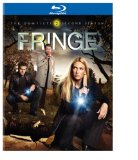| Reviews & Columns |
|
Reviews DVD TV on DVD Blu-ray 4K UHD International DVDs In Theaters Reviews by Studio Video Games Features Collector Series DVDs Easter Egg Database Interviews DVD Talk Radio Feature Articles Columns Anime Talk DVD Savant Horror DVDs The M.O.D. Squad Art House HD Talk Silent DVD
|
DVD Talk Forum |
|
|
| Resources |
|
DVD Price Search Customer Service #'s RCE Info Links |
|
Columns
|
|
|
Fringe: The Complete Second Season
Warner Bros. // Unrated // September 14, 2010
List Price: $69.97 [Buy now and save at Amazon]
The Season:
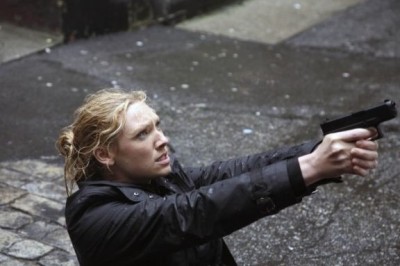 When I covered the premiere season of Fringe (click here to read up) last year, a sizable television event was on the brink of happening: the end of LOST. Since then, J.J. Abrams' myth-heavy arc about survivors on a supernatural island has come to a close, and a successor hasn't filled the void. Musings about the recently cancelled FlashForward potentially taking the throne have obviously been scratched, since the show received the proverbial axe after only one season, while other heady hopefuls have missed the mark. At one point, it was conjectured that Fringe could slip into that spot, though the roughness around the edges of the show's first season didn't bode well enough to place confidence in that. That, however, changes with this second season, in a very assured way. Is it the new LOST? No, it's not, and that's a very good thing; instead, it becomes a completely different beast that's even better, mixing accessible-yet-boggling sci-fi and compelling characters into a stylish, macabre stream of suspense.
When I covered the premiere season of Fringe (click here to read up) last year, a sizable television event was on the brink of happening: the end of LOST. Since then, J.J. Abrams' myth-heavy arc about survivors on a supernatural island has come to a close, and a successor hasn't filled the void. Musings about the recently cancelled FlashForward potentially taking the throne have obviously been scratched, since the show received the proverbial axe after only one season, while other heady hopefuls have missed the mark. At one point, it was conjectured that Fringe could slip into that spot, though the roughness around the edges of the show's first season didn't bode well enough to place confidence in that. That, however, changes with this second season, in a very assured way. Is it the new LOST? No, it's not, and that's a very good thing; instead, it becomes a completely different beast that's even better, mixing accessible-yet-boggling sci-fi and compelling characters into a stylish, macabre stream of suspense.
At the end of the first season, the foundation under the story arc had been flipped topsy-turvy. Literally. Agent Olivia Dunham (Anna Torv), after spending months embracing the extent of the FBI's Fringe Division and learning of other-worldly experiments she was involved in as a child, transported to another dimension to confront William Bell (Leonard Nimoy), head of the scientific research giant Massive Dynamic. The final shot of the episode involved the image of the World Trade Center still erect, proving that the reality she's entered isn't unlike her own -- just with a few changes dictated by different choices made. Fringe's second season picks up directly after this, with brilliant rogue Peter Bishop (Joshua Jackson) and his mad scientist father Walter (John Noble) investigating Olivia's disappearance. With a crash, she flies back into their reality, but not without that sizable download of information from Bell to spark her case.
One gripe with the first season of Fringe comes in its sludgy first half of episodes, where Abrams and his one-two punch of co-creators, Bob Orci and Alex Kurtzman, introduce the framework of their science-heavy conceptualization to somewhat tongue-tied, unassertive successes. It makes for some observable growing pains as they discover what works and what doesn't, though the show certainly remains compelling amid a scattering of mad science, David Cronenberg-level grotesquery, character development, and tension. To say that this isn't a problem in the second season would be an understatement; once Olivia regains her bearings with "our" world and the hunt for knowledge pushes on, the show very quickly regains its momentum. Behind the thrust of last year's finale, all the show's scattered triumphs brilliantly tie together into a very clear vision this time around.
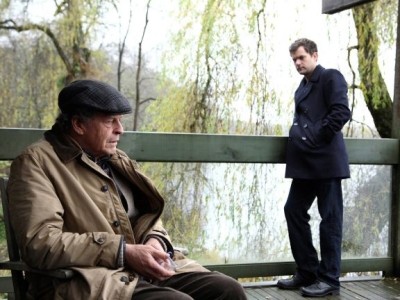 Olivia's conversation with William Bell, which focuses on the idea of converging worlds dangerously encroaching on one other, establishes a thoroughly unique, gripping element that Fringe had been missing up until that point. Though the mystery behind Massive Dynamic gave the previous season a suspenseful push that got its audience on the edges of their seats, it still lacked enough of a connective thread to make the show addictive to an appointment-worthy level. As the nature of the parallel dimensions comes into focus, between messages through world-connected typewriters and the eerie cloak-and-dagger presence of "visitors" from the other side, the show finds that meaty focus it lacked, adding a sense of immediacy behind Olivia's capacity to remember the details behind her visit -- symbols, pertinent dialogue from Bell -- and the way it all ties into Walter's history.
Olivia's conversation with William Bell, which focuses on the idea of converging worlds dangerously encroaching on one other, establishes a thoroughly unique, gripping element that Fringe had been missing up until that point. Though the mystery behind Massive Dynamic gave the previous season a suspenseful push that got its audience on the edges of their seats, it still lacked enough of a connective thread to make the show addictive to an appointment-worthy level. As the nature of the parallel dimensions comes into focus, between messages through world-connected typewriters and the eerie cloak-and-dagger presence of "visitors" from the other side, the show finds that meaty focus it lacked, adding a sense of immediacy behind Olivia's capacity to remember the details behind her visit -- symbols, pertinent dialogue from Bell -- and the way it all ties into Walter's history.
Fringe mixes this focal plot device with its familiar rhythm of beyond-the-norm procedural cases that the crew scrambles to solve, both in the underbelly of Walter's Harvard-located laboratory and on-location at crime scenes across the country. Amazingly, the science in the show has grown even more intricate, injecting each week's content with science that rides a razor-sharp line between absurdity and tangible authenticity. Several of the episodes ride that line a bit more mindfully, such as the idea of a contagious cancer transmitted through touch and the ability to control dreams through a wireless device implanted into the brain, while others involve a more deftly-removed sense of realism -- such as a few human-monster hybrids and a projection of a person's shadow that kills people from long distances away. But, no matter how crazy or rational, the show finds a way for the the science to make relative sense, while continuing to tie the meaning behind the cases back to Massive Dynamic and the research Bell and Bishop conducted.
Amid the science, Fringe's second season also reaches new levels of interaction between its textured characters, using the fabric of the "other world" as a way to touch on new perspectives. Each of the characters grows exponentially this time around, deepening our grip on their motives and dispositions through some effective and, oftentimes, very touching drama. Olivia, once the timid fish-out-of-water when it came to theoretical science, becomes more compelling as she explores the nature of her place as a research subject in the Jacksonville trials, while also strengthening her family-like bond with Peter and Walter in a very polished, sincere fashion. Anna Torv continues that emotional harshness from the first season as Olivia, yet she also allows her demeanor to soften as she spends more time acclimating to the Fringe Division's lunacy -- as well as strengthening her near-motherly bond with her niece.
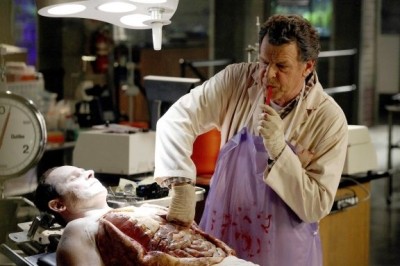 Peter and Walter's relationship evolves from their cynical head-butting into an endearing focus on Walter's scatterbrained dependence, offering charming exchanges between them that, again, brightens the oftentimes mechanical, grim show. Joshua Jackson dives head-on into his role as once-grifter Peter, filling out the character's allayed gruffness with a level of sincere comfort as he roots himself firmer into the Fringe Division's everyday mechanics. In relation, Walter Bishop attempts to become more independent with this season, steering away from his relative gratitude for being free from St. Claire's asylum to someone trying to regain his place as a man. In the process, Walter builds a unique relationship with his lab assistant Astrid (Jaskia Nicole), where the attitude they strike while conducting experiments involving dissections, bodily manipulation, and food -- Walter's other passion -- can be surprisingly warm-hearted amid her efforts to keep the mad scientist grounded.
Peter and Walter's relationship evolves from their cynical head-butting into an endearing focus on Walter's scatterbrained dependence, offering charming exchanges between them that, again, brightens the oftentimes mechanical, grim show. Joshua Jackson dives head-on into his role as once-grifter Peter, filling out the character's allayed gruffness with a level of sincere comfort as he roots himself firmer into the Fringe Division's everyday mechanics. In relation, Walter Bishop attempts to become more independent with this season, steering away from his relative gratitude for being free from St. Claire's asylum to someone trying to regain his place as a man. In the process, Walter builds a unique relationship with his lab assistant Astrid (Jaskia Nicole), where the attitude they strike while conducting experiments involving dissections, bodily manipulation, and food -- Walter's other passion -- can be surprisingly warm-hearted amid her efforts to keep the mad scientist grounded.
Ultimately, Fringe's second season becomes all about getting answers. Each episode, whether it's the case-by-case episodic mysteries or the bursts of narrative revolving around the "other world" and Massive Dynamic, finds a way to embed a healthy chunk of significant information into the mystery's intrigue. Unlike LOST's labyrinth of obscurity, the series actually readdresses the many seeds that it plants -- what part The Observer played in the Bishop family's life, the type of research Massive Dynamic conducts, and how dimension traveling is possible -- with confident, clear answers that the audience actually cares about, while also giving them an evocative center that ties back into the fabric of the characters. Of course, there are exceptions, though very few and far between; "The Bishop Revival", an episode rich with Walter's back story, overextends its forcefulness when it gravitates towards a bold take on modern Nazi-driven murder, while the mild 28 Days Later content in "Johari Window" teeters too far into disbelief. And then there's "Brown Betty", a spunky '50s noir fairy tale in Walter's mind that doesn't do much but lightly amuse.
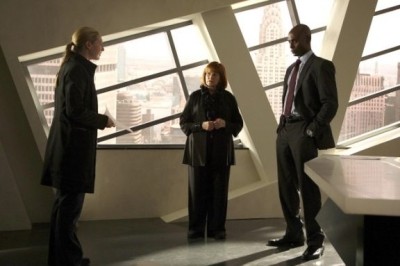 But then, there's "Peter", directed by Defying Gravity's David Straiton. I haven't mentioned many episodes by name, simply because this entire season maintains a consistent stream of excellence, but this one deserves a little discussion. Here, we're offered answers to the rather sizable riddle behind Peter's existence, as well as to the reason why a sobbing Walter glared down at a tombstone with his son's name scrolled on it in the first season. Quite simply, the orchestration of the answers received in this episode -- a flashback to the late '80s -- becomes something of a game-changer, yet it's not necessarily for its resolution. A blend of acute storytelling and excellent acting, including John Noble holding convincing poise as a youthful Walter, come together into a major pivoting point for the whole story arc. It conveys a level of emotion and thought-provocation within its exposition that'll rightfully, and purposefully, remain in the back of viewers' minds for the events to come.
But then, there's "Peter", directed by Defying Gravity's David Straiton. I haven't mentioned many episodes by name, simply because this entire season maintains a consistent stream of excellence, but this one deserves a little discussion. Here, we're offered answers to the rather sizable riddle behind Peter's existence, as well as to the reason why a sobbing Walter glared down at a tombstone with his son's name scrolled on it in the first season. Quite simply, the orchestration of the answers received in this episode -- a flashback to the late '80s -- becomes something of a game-changer, yet it's not necessarily for its resolution. A blend of acute storytelling and excellent acting, including John Noble holding convincing poise as a youthful Walter, come together into a major pivoting point for the whole story arc. It conveys a level of emotion and thought-provocation within its exposition that'll rightfully, and purposefully, remain in the back of viewers' minds for the events to come.
As the second season comes to a close, leading into the two-part finale "Over There", Fringe further continues to realize its promise as a distinct breed of mysterious science-fiction. Akiva Goldsman, who's responsible for several of the final episodes from last season, comes back to direct a relentlessly suspenseful finale that takes several of the key characters into uncharted territory. But, more than anything, it does proper justice to what the series has accomplished all throughout its cohesive twenty-plus episode string, mixing intrigue, emotion, and a chaotic cliff-hanger into a swirl of excitement that surpasses even that of some of LOST's better seasons. Quite simply, the writers behind Fringe have more than earned the right to have faith invested in their story, because this series really isn't just about theorization -- it's about unfaltering, expressive science-fiction with the right mix of questions and answers to reward an audience.
The Blu-ray:
Available on four discs, Warner Bros' high-definition presentation of Fringe: The Complete Second Season comes in a slim multi-disc presentation similar to the re-packaged Blade Runner Blu-rays. Inside, a slick little Episode Guide has been included with short, semi-spoiler laden descriptions attached to each. On top, a shiny slipcover has been included that, thankfully, does not have a lenticular top (Those ridges, man. They give me the shivers).
Video and Audio:
Considering that each disc come with either five or six (5-6) episode crammed on, Warner Brothers' presentation of Fringe's 1.78:1 1080p VC-1 encodes are extremely impressive. The series carries some of the slickest photography on the air right now, mixed with vibrant colors in the numerous items in Walter's laboratory and a wide arrangement of both lush and low-saturation shots, which gives the discs ample opportunity to showcase exactly what a modern arrangement of cinematography can look like in HD. And, wouldn't you know it, every single last one of the episodes looks phenomenal. The support for rich black levels pairs well with numble rendering of contrast, with only a few dark scenes growing noisy, while the robust colors in lush grass, the ruby red of watery blood (and other stuff) in the Fringe Division HQ, and the array of assorted skin tones are cradles to a beautiful, natural level. The quality in retaining FOX's broadcast look takes a step up from the last time around, with only a few over-embellished shades of color, a handful of smeary facial textures, and some noisy backgrounds being the sole faults on these eye-popping episodes.
Once again, however, Warner Bros. have opted to use standard Dolby Digital 5.1 tracks for the episodes, an expected fault considering the studio's consistent decisions to do so with television series. With that in mind, the standard audio tracks still deliver heartily, utilizing the show's aggressive, stylish sound design to emphasize low-end and mid-range effects. Some nice instances of separation reach to the sides and rear of the stage, especially when in the midst of Walter's laboratory, while a few startling sound effects -- the shattering of glass, gun shots, and the occasional explosion -- echo from the front to the rears with a fine amount of force. But, as expected, there's only so much that these Dolby Digital audio tracks can accomplish, with suppresses the clarity of a few other sound effects and hampers the clarity of dialogue in a few spots. However, those are undoubtedly not the norm, as the rampant ramblings about scientific content mingle with dramatic lines from the cast to crisp degrees. Subtitles are available in English SDH, French, and Spanish texts.
Special Features:
Commentaries:
Audio commentaries are available on four episodes -- "Moment Deferred", "Peter", "Brown Betty", and "Over There, Part II" -- with different participants in each, some with creative crew participants and others with cast members in the fray. "Moment Deferred" features Jill Risk, Matthew Pitts, Danielle Dispaltro, Justin Doble, and Charles Scott IV, where discussion falls on J.J. Abrams' description of the "mystery box" and the structure of the season, as well some talk about the episode's original title and how many added pages can be tossed into the script on-the-fly at a given time. The commentary for "Peter" features actors John Noble (Walter) and Blair Brown (Nina Sharp), along with well-warranted moderation from Damian Holbrook that steers the two actors in the right directions for answering intriguing questions. They discuss making their characters appear younger, the strength of their prop and set design people, and the nature of their characters in context to the '80s time period.
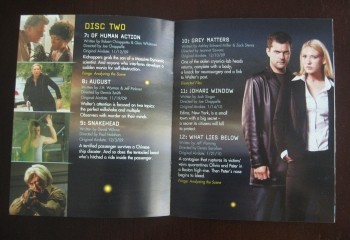 The other two commentary tracks arrive on the fourth disc, starting with the "Brown Betty" track featuring Tanya Swerling, Billy Gottlieb, Chris Tilton, and Jay Worth. They discuss the humor coming from Walter's "altered" state and the placement of the music, as well as Easter eggs that the creators placed at opportune moments in the episodes -- such as a poster for Clue in the episode "Peter". Then, we've got a playful track for the second half of "Over There", which features producers Jeff Pinkner and J.H. Wyman, and director Akiva Goldsman. They delve into more Film/TV 101 stuff, such as which shots are stock footage, the crazy lighting in specific scenes, the off-and-on awkwardness of monitor acting, and improvisation in dialogue.
The other two commentary tracks arrive on the fourth disc, starting with the "Brown Betty" track featuring Tanya Swerling, Billy Gottlieb, Chris Tilton, and Jay Worth. They discuss the humor coming from Walter's "altered" state and the placement of the music, as well as Easter eggs that the creators placed at opportune moments in the episodes -- such as a poster for Clue in the episode "Peter". Then, we've got a playful track for the second half of "Over There", which features producers Jeff Pinkner and J.H. Wyman, and director Akiva Goldsman. They delve into more Film/TV 101 stuff, such as which shots are stock footage, the crazy lighting in specific scenes, the off-and-on awkwardness of monitor acting, and improvisation in dialogue.
Also included with several of the episodes are Analyzing the Scene (HD) blurbs, which are brief behind-the-scenes snippets that cover the construction of the specific episode's key elements, as well as Dissected Files (SD), which can be translated to "deleted scenes"
-----
The brunt of the special features can be located on Disc Four, which are all very thick with spoiler-heavy material -- discussion about the resolutions to "the other side", the answers behind the "Peter" episode, and many, many others. Therefore, these should obviously be watched after the season has been viewed, but I suppose that goes without much saying.
The Unearthed Episode (43:47, HD VC-1):
Is "Unearthed" an episode from season one that simply never aired (hint: yes), or is it a glimpse into an alternate universe like the marketing suggests? You can have fun with it either way, as it's simply another episode of Fringe that features a girl who awakens from a surgical operation and blurts out the call numbers for a naval officer. Charlie's alive, Peter's sharp-eyed bitterness has returned, and Astrid's haircut has reverted back to its puffy state, while the episode itself has an episodic property about it that makes it able to be inserted just about anywhere in the premiere season.
Beyond the Pattern: The Mystery of Fringe (26:49, HD VC-1):
J.J. Abrams, producers Pinkner and Wyman, director Goldsman, and the cast/crew come forth in this fairly lengthy assembly piece, which covers the construction -- and emphasis -- of this second season. Goldsman delves into his interest in the series and how the mythology had already been established at that point, as well as how this season addresses the "meat of the matter" while the first season serves almost as a prologue. Discussion falls a bit on the expository side of things, covering why Olivia is "so important" and the process in which William Bell and Walter Bishop concocted the idea of an alternate universe, all intermingled with clips from the show itself. But discussion also falls on some deeper aspects of the characters, including interview time with Jaskia Nicole as she discusses Astrid's importance to Walter. It's pretty standard material, but intriguing nonetheless. Fun fact: a lot of the interviews are done while on-set during the "Brown Betty" episode, so many of the actors are in their '50s-era getup for the interviews.
Rounding things out are the Unusual Side Effects (3:22, SD VC-1) gag reel and an exploration of the Fringe Division HQ featuring John Noble and props master Rob Smith, entitled In the Lab (6:36, HD VC-1).
Final Thoughts:
Fringe's first season exhibited a lack of clarity in how to handle the moving parts present in its content, unable to strike a perfect balance between characters, science-fiction intricacy, and momentum -- yet it was still very good. Season two, however, realizes the extent of its promise, creating a mystery-laden arc filled with superb emotional context and a wealth of gross-yet-compelling theoretical science. Everything that the creators and writers did correctly from the start only heightens here, culminating into a superb stretch of episodes that rarely (once, actually) lets up from the gripping, suspense-driven momentum. Warner Bros.' Blu-ray packs a slick punch in the visual department, while loading the discs up with a very healthy amount of commentaries, deleted scenes, behind-the-scenes features and other ephemera. Highly Recommended.
Thomas Spurlin, Staff Reviewer -- DVDTalk Reviews | Personal Blog/Site
 When I covered the premiere season of Fringe (click here to read up) last year, a sizable television event was on the brink of happening: the end of LOST. Since then, J.J. Abrams' myth-heavy arc about survivors on a supernatural island has come to a close, and a successor hasn't filled the void. Musings about the recently cancelled FlashForward potentially taking the throne have obviously been scratched, since the show received the proverbial axe after only one season, while other heady hopefuls have missed the mark. At one point, it was conjectured that Fringe could slip into that spot, though the roughness around the edges of the show's first season didn't bode well enough to place confidence in that. That, however, changes with this second season, in a very assured way. Is it the new LOST? No, it's not, and that's a very good thing; instead, it becomes a completely different beast that's even better, mixing accessible-yet-boggling sci-fi and compelling characters into a stylish, macabre stream of suspense.
When I covered the premiere season of Fringe (click here to read up) last year, a sizable television event was on the brink of happening: the end of LOST. Since then, J.J. Abrams' myth-heavy arc about survivors on a supernatural island has come to a close, and a successor hasn't filled the void. Musings about the recently cancelled FlashForward potentially taking the throne have obviously been scratched, since the show received the proverbial axe after only one season, while other heady hopefuls have missed the mark. At one point, it was conjectured that Fringe could slip into that spot, though the roughness around the edges of the show's first season didn't bode well enough to place confidence in that. That, however, changes with this second season, in a very assured way. Is it the new LOST? No, it's not, and that's a very good thing; instead, it becomes a completely different beast that's even better, mixing accessible-yet-boggling sci-fi and compelling characters into a stylish, macabre stream of suspense. At the end of the first season, the foundation under the story arc had been flipped topsy-turvy. Literally. Agent Olivia Dunham (Anna Torv), after spending months embracing the extent of the FBI's Fringe Division and learning of other-worldly experiments she was involved in as a child, transported to another dimension to confront William Bell (Leonard Nimoy), head of the scientific research giant Massive Dynamic. The final shot of the episode involved the image of the World Trade Center still erect, proving that the reality she's entered isn't unlike her own -- just with a few changes dictated by different choices made. Fringe's second season picks up directly after this, with brilliant rogue Peter Bishop (Joshua Jackson) and his mad scientist father Walter (John Noble) investigating Olivia's disappearance. With a crash, she flies back into their reality, but not without that sizable download of information from Bell to spark her case.
One gripe with the first season of Fringe comes in its sludgy first half of episodes, where Abrams and his one-two punch of co-creators, Bob Orci and Alex Kurtzman, introduce the framework of their science-heavy conceptualization to somewhat tongue-tied, unassertive successes. It makes for some observable growing pains as they discover what works and what doesn't, though the show certainly remains compelling amid a scattering of mad science, David Cronenberg-level grotesquery, character development, and tension. To say that this isn't a problem in the second season would be an understatement; once Olivia regains her bearings with "our" world and the hunt for knowledge pushes on, the show very quickly regains its momentum. Behind the thrust of last year's finale, all the show's scattered triumphs brilliantly tie together into a very clear vision this time around.
 Olivia's conversation with William Bell, which focuses on the idea of converging worlds dangerously encroaching on one other, establishes a thoroughly unique, gripping element that Fringe had been missing up until that point. Though the mystery behind Massive Dynamic gave the previous season a suspenseful push that got its audience on the edges of their seats, it still lacked enough of a connective thread to make the show addictive to an appointment-worthy level. As the nature of the parallel dimensions comes into focus, between messages through world-connected typewriters and the eerie cloak-and-dagger presence of "visitors" from the other side, the show finds that meaty focus it lacked, adding a sense of immediacy behind Olivia's capacity to remember the details behind her visit -- symbols, pertinent dialogue from Bell -- and the way it all ties into Walter's history.
Olivia's conversation with William Bell, which focuses on the idea of converging worlds dangerously encroaching on one other, establishes a thoroughly unique, gripping element that Fringe had been missing up until that point. Though the mystery behind Massive Dynamic gave the previous season a suspenseful push that got its audience on the edges of their seats, it still lacked enough of a connective thread to make the show addictive to an appointment-worthy level. As the nature of the parallel dimensions comes into focus, between messages through world-connected typewriters and the eerie cloak-and-dagger presence of "visitors" from the other side, the show finds that meaty focus it lacked, adding a sense of immediacy behind Olivia's capacity to remember the details behind her visit -- symbols, pertinent dialogue from Bell -- and the way it all ties into Walter's history. Fringe mixes this focal plot device with its familiar rhythm of beyond-the-norm procedural cases that the crew scrambles to solve, both in the underbelly of Walter's Harvard-located laboratory and on-location at crime scenes across the country. Amazingly, the science in the show has grown even more intricate, injecting each week's content with science that rides a razor-sharp line between absurdity and tangible authenticity. Several of the episodes ride that line a bit more mindfully, such as the idea of a contagious cancer transmitted through touch and the ability to control dreams through a wireless device implanted into the brain, while others involve a more deftly-removed sense of realism -- such as a few human-monster hybrids and a projection of a person's shadow that kills people from long distances away. But, no matter how crazy or rational, the show finds a way for the the science to make relative sense, while continuing to tie the meaning behind the cases back to Massive Dynamic and the research Bell and Bishop conducted.
Amid the science, Fringe's second season also reaches new levels of interaction between its textured characters, using the fabric of the "other world" as a way to touch on new perspectives. Each of the characters grows exponentially this time around, deepening our grip on their motives and dispositions through some effective and, oftentimes, very touching drama. Olivia, once the timid fish-out-of-water when it came to theoretical science, becomes more compelling as she explores the nature of her place as a research subject in the Jacksonville trials, while also strengthening her family-like bond with Peter and Walter in a very polished, sincere fashion. Anna Torv continues that emotional harshness from the first season as Olivia, yet she also allows her demeanor to soften as she spends more time acclimating to the Fringe Division's lunacy -- as well as strengthening her near-motherly bond with her niece.
 Peter and Walter's relationship evolves from their cynical head-butting into an endearing focus on Walter's scatterbrained dependence, offering charming exchanges between them that, again, brightens the oftentimes mechanical, grim show. Joshua Jackson dives head-on into his role as once-grifter Peter, filling out the character's allayed gruffness with a level of sincere comfort as he roots himself firmer into the Fringe Division's everyday mechanics. In relation, Walter Bishop attempts to become more independent with this season, steering away from his relative gratitude for being free from St. Claire's asylum to someone trying to regain his place as a man. In the process, Walter builds a unique relationship with his lab assistant Astrid (Jaskia Nicole), where the attitude they strike while conducting experiments involving dissections, bodily manipulation, and food -- Walter's other passion -- can be surprisingly warm-hearted amid her efforts to keep the mad scientist grounded.
Peter and Walter's relationship evolves from their cynical head-butting into an endearing focus on Walter's scatterbrained dependence, offering charming exchanges between them that, again, brightens the oftentimes mechanical, grim show. Joshua Jackson dives head-on into his role as once-grifter Peter, filling out the character's allayed gruffness with a level of sincere comfort as he roots himself firmer into the Fringe Division's everyday mechanics. In relation, Walter Bishop attempts to become more independent with this season, steering away from his relative gratitude for being free from St. Claire's asylum to someone trying to regain his place as a man. In the process, Walter builds a unique relationship with his lab assistant Astrid (Jaskia Nicole), where the attitude they strike while conducting experiments involving dissections, bodily manipulation, and food -- Walter's other passion -- can be surprisingly warm-hearted amid her efforts to keep the mad scientist grounded. Ultimately, Fringe's second season becomes all about getting answers. Each episode, whether it's the case-by-case episodic mysteries or the bursts of narrative revolving around the "other world" and Massive Dynamic, finds a way to embed a healthy chunk of significant information into the mystery's intrigue. Unlike LOST's labyrinth of obscurity, the series actually readdresses the many seeds that it plants -- what part The Observer played in the Bishop family's life, the type of research Massive Dynamic conducts, and how dimension traveling is possible -- with confident, clear answers that the audience actually cares about, while also giving them an evocative center that ties back into the fabric of the characters. Of course, there are exceptions, though very few and far between; "The Bishop Revival", an episode rich with Walter's back story, overextends its forcefulness when it gravitates towards a bold take on modern Nazi-driven murder, while the mild 28 Days Later content in "Johari Window" teeters too far into disbelief. And then there's "Brown Betty", a spunky '50s noir fairy tale in Walter's mind that doesn't do much but lightly amuse.
 But then, there's "Peter", directed by Defying Gravity's David Straiton. I haven't mentioned many episodes by name, simply because this entire season maintains a consistent stream of excellence, but this one deserves a little discussion. Here, we're offered answers to the rather sizable riddle behind Peter's existence, as well as to the reason why a sobbing Walter glared down at a tombstone with his son's name scrolled on it in the first season. Quite simply, the orchestration of the answers received in this episode -- a flashback to the late '80s -- becomes something of a game-changer, yet it's not necessarily for its resolution. A blend of acute storytelling and excellent acting, including John Noble holding convincing poise as a youthful Walter, come together into a major pivoting point for the whole story arc. It conveys a level of emotion and thought-provocation within its exposition that'll rightfully, and purposefully, remain in the back of viewers' minds for the events to come.
But then, there's "Peter", directed by Defying Gravity's David Straiton. I haven't mentioned many episodes by name, simply because this entire season maintains a consistent stream of excellence, but this one deserves a little discussion. Here, we're offered answers to the rather sizable riddle behind Peter's existence, as well as to the reason why a sobbing Walter glared down at a tombstone with his son's name scrolled on it in the first season. Quite simply, the orchestration of the answers received in this episode -- a flashback to the late '80s -- becomes something of a game-changer, yet it's not necessarily for its resolution. A blend of acute storytelling and excellent acting, including John Noble holding convincing poise as a youthful Walter, come together into a major pivoting point for the whole story arc. It conveys a level of emotion and thought-provocation within its exposition that'll rightfully, and purposefully, remain in the back of viewers' minds for the events to come. As the second season comes to a close, leading into the two-part finale "Over There", Fringe further continues to realize its promise as a distinct breed of mysterious science-fiction. Akiva Goldsman, who's responsible for several of the final episodes from last season, comes back to direct a relentlessly suspenseful finale that takes several of the key characters into uncharted territory. But, more than anything, it does proper justice to what the series has accomplished all throughout its cohesive twenty-plus episode string, mixing intrigue, emotion, and a chaotic cliff-hanger into a swirl of excitement that surpasses even that of some of LOST's better seasons. Quite simply, the writers behind Fringe have more than earned the right to have faith invested in their story, because this series really isn't just about theorization -- it's about unfaltering, expressive science-fiction with the right mix of questions and answers to reward an audience.
The Blu-ray:
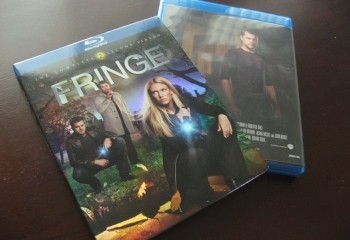 | 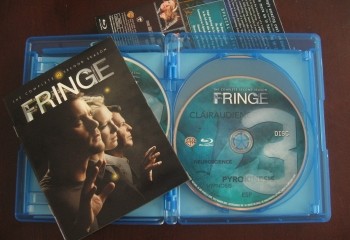 |
Available on four discs, Warner Bros' high-definition presentation of Fringe: The Complete Second Season comes in a slim multi-disc presentation similar to the re-packaged Blade Runner Blu-rays. Inside, a slick little Episode Guide has been included with short, semi-spoiler laden descriptions attached to each. On top, a shiny slipcover has been included that, thankfully, does not have a lenticular top (Those ridges, man. They give me the shivers).
Video and Audio:
Considering that each disc come with either five or six (5-6) episode crammed on, Warner Brothers' presentation of Fringe's 1.78:1 1080p VC-1 encodes are extremely impressive. The series carries some of the slickest photography on the air right now, mixed with vibrant colors in the numerous items in Walter's laboratory and a wide arrangement of both lush and low-saturation shots, which gives the discs ample opportunity to showcase exactly what a modern arrangement of cinematography can look like in HD. And, wouldn't you know it, every single last one of the episodes looks phenomenal. The support for rich black levels pairs well with numble rendering of contrast, with only a few dark scenes growing noisy, while the robust colors in lush grass, the ruby red of watery blood (and other stuff) in the Fringe Division HQ, and the array of assorted skin tones are cradles to a beautiful, natural level. The quality in retaining FOX's broadcast look takes a step up from the last time around, with only a few over-embellished shades of color, a handful of smeary facial textures, and some noisy backgrounds being the sole faults on these eye-popping episodes.
Once again, however, Warner Bros. have opted to use standard Dolby Digital 5.1 tracks for the episodes, an expected fault considering the studio's consistent decisions to do so with television series. With that in mind, the standard audio tracks still deliver heartily, utilizing the show's aggressive, stylish sound design to emphasize low-end and mid-range effects. Some nice instances of separation reach to the sides and rear of the stage, especially when in the midst of Walter's laboratory, while a few startling sound effects -- the shattering of glass, gun shots, and the occasional explosion -- echo from the front to the rears with a fine amount of force. But, as expected, there's only so much that these Dolby Digital audio tracks can accomplish, with suppresses the clarity of a few other sound effects and hampers the clarity of dialogue in a few spots. However, those are undoubtedly not the norm, as the rampant ramblings about scientific content mingle with dramatic lines from the cast to crisp degrees. Subtitles are available in English SDH, French, and Spanish texts.
Special Features:
Commentaries:
Audio commentaries are available on four episodes -- "Moment Deferred", "Peter", "Brown Betty", and "Over There, Part II" -- with different participants in each, some with creative crew participants and others with cast members in the fray. "Moment Deferred" features Jill Risk, Matthew Pitts, Danielle Dispaltro, Justin Doble, and Charles Scott IV, where discussion falls on J.J. Abrams' description of the "mystery box" and the structure of the season, as well some talk about the episode's original title and how many added pages can be tossed into the script on-the-fly at a given time. The commentary for "Peter" features actors John Noble (Walter) and Blair Brown (Nina Sharp), along with well-warranted moderation from Damian Holbrook that steers the two actors in the right directions for answering intriguing questions. They discuss making their characters appear younger, the strength of their prop and set design people, and the nature of their characters in context to the '80s time period.
 The other two commentary tracks arrive on the fourth disc, starting with the "Brown Betty" track featuring Tanya Swerling, Billy Gottlieb, Chris Tilton, and Jay Worth. They discuss the humor coming from Walter's "altered" state and the placement of the music, as well as Easter eggs that the creators placed at opportune moments in the episodes -- such as a poster for Clue in the episode "Peter". Then, we've got a playful track for the second half of "Over There", which features producers Jeff Pinkner and J.H. Wyman, and director Akiva Goldsman. They delve into more Film/TV 101 stuff, such as which shots are stock footage, the crazy lighting in specific scenes, the off-and-on awkwardness of monitor acting, and improvisation in dialogue.
The other two commentary tracks arrive on the fourth disc, starting with the "Brown Betty" track featuring Tanya Swerling, Billy Gottlieb, Chris Tilton, and Jay Worth. They discuss the humor coming from Walter's "altered" state and the placement of the music, as well as Easter eggs that the creators placed at opportune moments in the episodes -- such as a poster for Clue in the episode "Peter". Then, we've got a playful track for the second half of "Over There", which features producers Jeff Pinkner and J.H. Wyman, and director Akiva Goldsman. They delve into more Film/TV 101 stuff, such as which shots are stock footage, the crazy lighting in specific scenes, the off-and-on awkwardness of monitor acting, and improvisation in dialogue. Also included with several of the episodes are Analyzing the Scene (HD) blurbs, which are brief behind-the-scenes snippets that cover the construction of the specific episode's key elements, as well as Dissected Files (SD), which can be translated to "deleted scenes"
-----
The brunt of the special features can be located on Disc Four, which are all very thick with spoiler-heavy material -- discussion about the resolutions to "the other side", the answers behind the "Peter" episode, and many, many others. Therefore, these should obviously be watched after the season has been viewed, but I suppose that goes without much saying.
The Unearthed Episode (43:47, HD VC-1):
Is "Unearthed" an episode from season one that simply never aired (hint: yes), or is it a glimpse into an alternate universe like the marketing suggests? You can have fun with it either way, as it's simply another episode of Fringe that features a girl who awakens from a surgical operation and blurts out the call numbers for a naval officer. Charlie's alive, Peter's sharp-eyed bitterness has returned, and Astrid's haircut has reverted back to its puffy state, while the episode itself has an episodic property about it that makes it able to be inserted just about anywhere in the premiere season.
Beyond the Pattern: The Mystery of Fringe (26:49, HD VC-1):
J.J. Abrams, producers Pinkner and Wyman, director Goldsman, and the cast/crew come forth in this fairly lengthy assembly piece, which covers the construction -- and emphasis -- of this second season. Goldsman delves into his interest in the series and how the mythology had already been established at that point, as well as how this season addresses the "meat of the matter" while the first season serves almost as a prologue. Discussion falls a bit on the expository side of things, covering why Olivia is "so important" and the process in which William Bell and Walter Bishop concocted the idea of an alternate universe, all intermingled with clips from the show itself. But discussion also falls on some deeper aspects of the characters, including interview time with Jaskia Nicole as she discusses Astrid's importance to Walter. It's pretty standard material, but intriguing nonetheless. Fun fact: a lot of the interviews are done while on-set during the "Brown Betty" episode, so many of the actors are in their '50s-era getup for the interviews.
Rounding things out are the Unusual Side Effects (3:22, SD VC-1) gag reel and an exploration of the Fringe Division HQ featuring John Noble and props master Rob Smith, entitled In the Lab (6:36, HD VC-1).
Final Thoughts:
Fringe's first season exhibited a lack of clarity in how to handle the moving parts present in its content, unable to strike a perfect balance between characters, science-fiction intricacy, and momentum -- yet it was still very good. Season two, however, realizes the extent of its promise, creating a mystery-laden arc filled with superb emotional context and a wealth of gross-yet-compelling theoretical science. Everything that the creators and writers did correctly from the start only heightens here, culminating into a superb stretch of episodes that rarely (once, actually) lets up from the gripping, suspense-driven momentum. Warner Bros.' Blu-ray packs a slick punch in the visual department, while loading the discs up with a very healthy amount of commentaries, deleted scenes, behind-the-scenes features and other ephemera. Highly Recommended.
|
| Popular Reviews |
| Sponsored Links |
|
|
| Sponsored Links |
|
|
| Release List | Reviews | Shop | Newsletter | Forum | DVD Giveaways | Blu-Ray | Advertise |
|
Copyright 2024 DVDTalk.com All Rights Reserved. Legal Info, Privacy Policy, Terms of Use,
Manage Preferences,
Your Privacy Choices | |||||||









